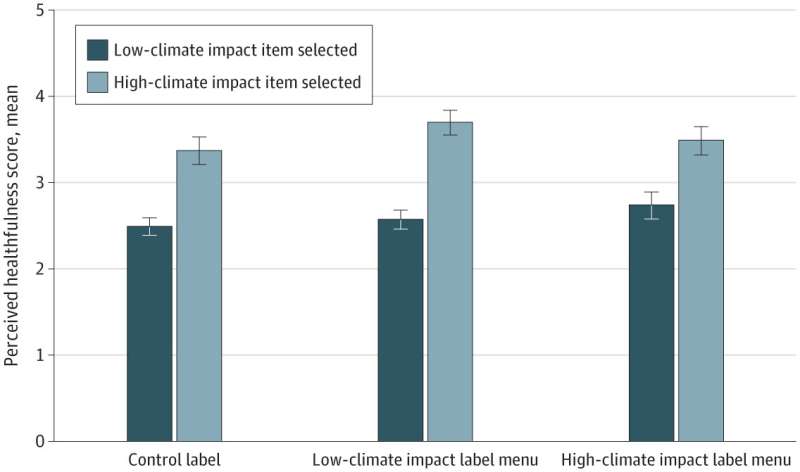This article has been reviewed according to Science X's editorial process and policies. Editors have highlighted the following attributes while ensuring the content's credibility:
fact-checked
peer-reviewed publication
trusted source
proofread
Study finds climate impact labels on sample fast food menu had strong effect on food selection

A new study has found that including climate impact labels on a sample fast food menu influenced participants' food choices in favor of more climate-friendly items. The study was led by a researcher at the Johns Hopkins Bloomberg School of Public Health.
For the study, more than 5,000 online participants were shown a sample menu resembling a fast food menu and asked to choose a single item for dinner. One group of participants received a menu with non-red meat menu items such as chicken sandwiches labeled "low climate impact." Another group received a menu with red meat items—burgers—labeled "high climate impact." A third control group received menus with QR codes on all items and no climate labels.
Both the high and low climate impact labels markedly reduced red meat selections compared to the control group, with the high impact labels having a strong effect. Menus with a "high climate impact" label on burgers increased non-beef choices by 23% compared to the control group. Menus that included "low climate impact" labels increased non-beef choices, such as a chicken sandwich or a salad, by about 10% more participants than those in the control group.
The study was published online December 27 in JAMA Network Open.
"These results suggest that menu labeling, particularly labels warning that an item has high climate impact, can be an effective strategy for encouraging more sustainable food choices in a fast food setting," says study lead author Julia Wolfson, Ph.D., associate professor in the Department of International Health at the Bloomberg School.
Using labels on menus has long been seen as a potential approach for promoting healthful and sustainable food options.
For their study, Wolfson and her co-authors wanted to test how signaling climate change impacts of fast food menu items might prompt people to opt for less red meat. Red meat consumption has been linked to health problems such as colorectal cancer, stroke, type 2 diabetes, and other illnesses. Less consumption of red meat also would also help to lower greenhouse gas emissions which would help reduce climate change because beef production is the largest contributor of greenhouse gas emissions in the food and agriculture sector.
The study was fielded from March 30 to April 13, 2022, and included 5,049 nationwide participants. The "low climate impact" labels for vegetarian, chicken, or fish menu items were green. The "high climate impact" labels for all beef burger choices were red. The authors based the high/low impact climate categories on evidence that beef has high climate impact compared to other proteins.
In addition to being asked to choose an item for dinner, participants were asked to rate how healthy they thought the item they ordered was. No matter which type of label was on the menu viewed, participants who selected a more sustainable (i.e., non-beef) item perceived their choice to be healthier compared to those who selected a beef item.
To assess the healthfulness of the sample menu items, the researchers applied a widely used measure called the Nutritional Profiling Index. The Index measures the healthfulness of foods on a 100-point scale, with 64 and lower considered healthful. The researchers found that the choices of the "high climate impact" label group scored slightly better than those of the control group and the "low climate impact" group. However, none of the items on the menu scored high enough to be considered optimally healthful.
While encouraging on the whole, the results suggest that positively framed "low climate impact" labels are less effective in encouraging sustainable food choices compared to "high climate impact" labels. At the same time, climate labels may have the unwanted side effect of making a choice seem healthier than it actually is.
"An undeserved health halo conferred to unhealthy menu items could encourage their overconsumption," Wolfson says. "So we have to look for labeling strategies that create 'win-wins' for promoting both more sustainable and healthy choices."
Wolfson and her colleagues aim to do similar studies in more real-world food-choice settings.
"Effect of climate change impact menu labels on fast food ordering choices among US adults: a randomized clinical trial" was co-authored by Julia Wolfson, Aviva Musicus, Cindy Leung, Ashley Gearhardt, and Jennifer Falbe.
More information: Julia A. Wolfson et al, Effect of Climate Change Impact Menu Labels on Fast Food Ordering Choices Among US Adults, JAMA Network Open (2022). DOI: 10.1001/jamanetworkopen.2022.48320



















